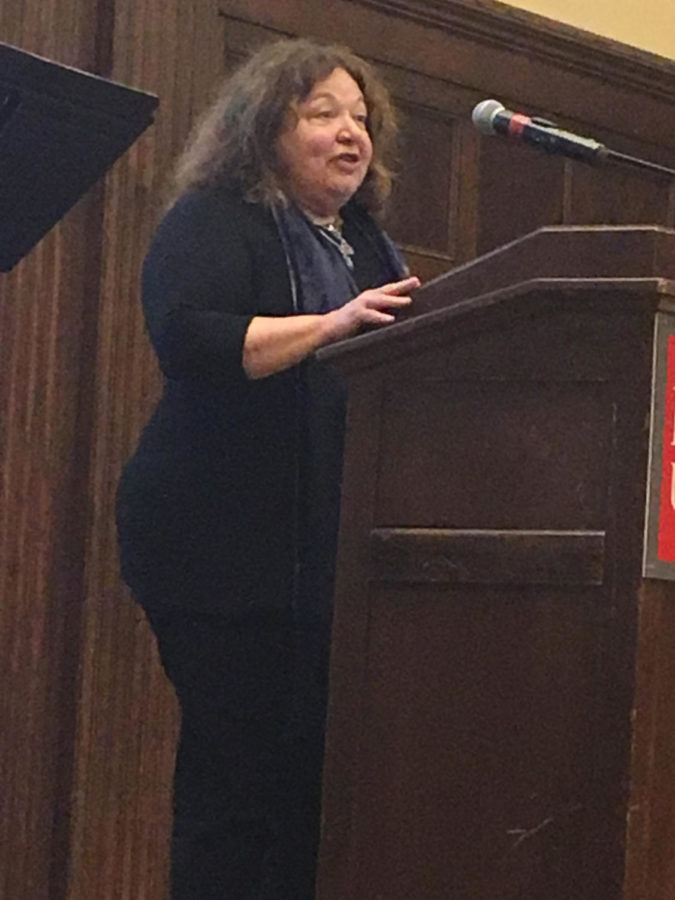Eco-theatre and a new call to action for the enviroment
Alexandra Kelly/Iowa State Daily
Cizmar divining into her muse behind two of her main characters, Alice and Lilly. Cizmar is a famous playwriter whose plays are inspired about the environment and science. The lectures program had Cizmar speak on April 4. in the South Ballroom of the Memorial Union.
April 4, 2017
Popular culture has the power to motivate an audience to take action or raise awareness for an important issue. Eco-theatre is an emerging genre delivering an important environmental message.
On Tuesday evening at the Memorial Union, Paula Cizmar, award-winning playwright and associate professor of theater at the University of Southern California School of Dramatic Arts, showed how the arts take on important issues like environmental sciences.
Her lecture, “Eco–Theatre: The Intersection of Art, Politics and Environmental Science,” discussed the power that eco-theater has to convey a message to the audience.
Cizmar considers eco-theatre an emerging genre. There have always been plays about nature and the environment, but eco-theatre is gaining traction due to the current situation.
“It hasn’t really been something that people have been writing about for a long time or in any great detail,” Cizmar said. “And I think that is because the issues of climate change and environmental problems have started to become part of our focus now as humans who are basically staring down the end of a gun and seeing if we don’t make some changes that rampant destruction is coming soon.”
As a member of the Earth Sciences Communication Initiative at the Annenberg School of Communication and Journalism, Cizmar tried to find a solution to help garner interest and action from the general public with the environment.
Her answer was to use the artist to help tell a story that could generate more emotion and feelings than a scientific lecture.
“The general public only really gets engaged when you tell them stories, when you give them anecdotes, and when you involve them personally in the struggles of characters and people who have something to gain and something to lose,” Cizmar said.
As a playwright, Cizmar has contributed her own talents to this issue in the form of eco-theatre.
Two scenes from her play, The Chisera, were read during the lecture. In one of the scenes, Alice, a female geologist, has a heated conversation with the lawyer of a local tribe about the merits of putting a solar plant on their sacred land.
The scene highlights the need for renewable energy like solar power, but also the problems it can create with the current inhabitants of the area.
That particular scene for The Chisera displays an important piece of eco-theatre. It is not something that is just about resources or the environment, but it is about decisions that will influence all of us.
“Eco-theater, which just seems like something that just middle-class environmentalists and Sierra Club types are interested in, is actually something that affects us all,” Cizmar said. “It has a feminist component. It has a racial component. It has an economic component, and it definitely has a human component.”
Cizmar’s works have gained national recognition and have been performed all over the country. She earned a National Endowment for the Arts grant and a Susan Smith Blackburn Prize Special Commendation for her play The Death of a Miner.
The work focused on rights, class and diversity issues, according to her website.
Cizmar also worked on the acclaimed documentary play, Seven, where she was one of the seven playwrights who collaborated to tell the stories of women in the Vital Voices Global Leadership Network who brought about major changes in their home countries, according to the play’s website.
The lecture was part of the Pearl Hogrefe Visiting Writers Series, which brings in environmental writers, scientists and artists for public lectures.







